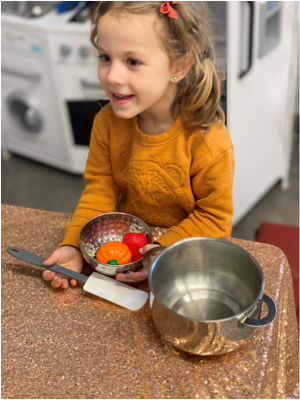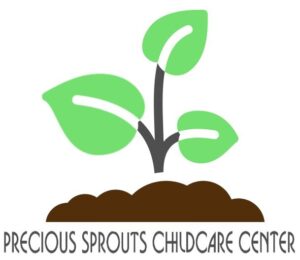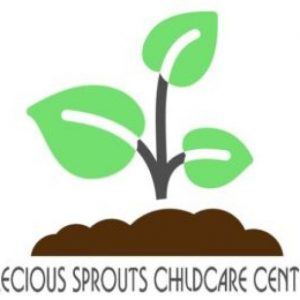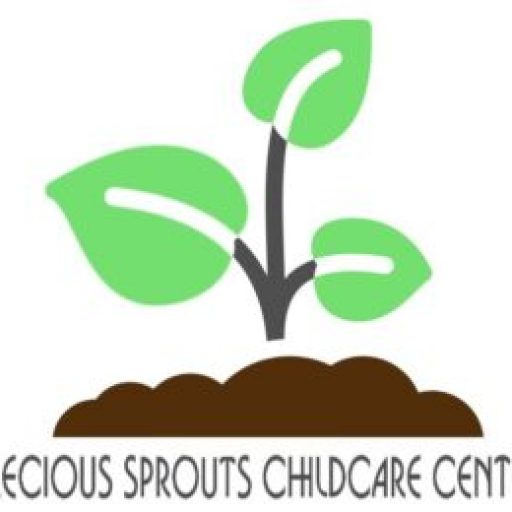CURRICULUM
CURRICULUM AT PRECIOUS SPROUTS
In order to meet the developmental needs of our children, Our program concentrates on active learning on the part of the child, both physically and mentally. Our curriculum is based on children’s self- directed exploration, discovery, play, real work, relationship building, and gaining a sense of competency. Children are given ample opportunity to explore and experiment at their own level of knowledge. Our educators plan activities that are interesting and satisfying. We believe unstructured play enables children to imitate adults, improve motor skills, build confidence, develop creativity and learn to cooperate with their friends. Children daily care needs Following is how our program meets the developmental needs of the children:
Your Language, My Language
Our children come from different parts of the world, to embrace their identity, our educators provide opportunities to learn about our children’s culture and language. Our staff celebrate diversity through celebrating similarities and differences, having open conversations about stereotypes and biases, teaching our children to ask questions. Lastly, we celebrate what makes our children special.
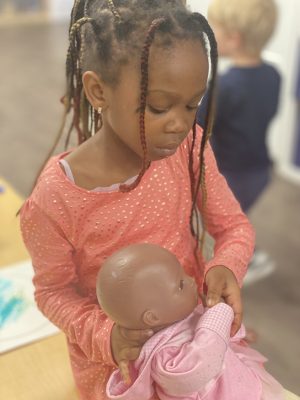
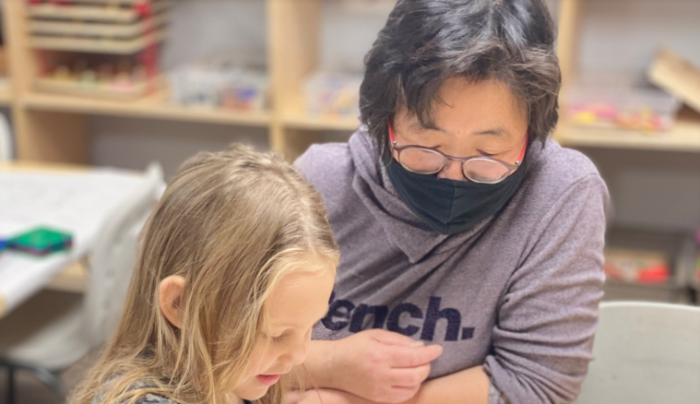
Early Literacy
We support early literacy simply by communicating with children, reading, and allowing children to participate in various activities.
Our program focuses on emergent literacy. Children learn about books and pre text through everyday activities. For example, When reading stories like Brown Bear, what do you see? Our staff find opportunities for children to fill in repeated phrases such as “looking at me.” Also, Our staff give children an opportunity to tell stories to one another based on the pictures in a book. We display books where children can reach them, and rotate them to keep children engaged. Lastly, We Label everyday items in our classroom which helps children with familiarization of pictures and words.
Mind & Body
Children’s physical development is supported by planning activities that promote good coordination, core stability, and gain gross motor skills and fine motor skills. In order to promote healthy lifestyle, our children participate in daily outdoor play (weather permitting). Children are given opportunities to participate in games or simply roll, walk, run, throw, and jump. Our children participate in indoor and and outdoor gross motor activities daily. Our children spend 2-3 hours of their daily time outdoors in the summer months and a minimum of 1- 2 hours in the winter months. Our children also take part in activities such as skating, tobogganing, yoga, and dance. Our children also have access to the large play structure, splash park, and the skating rink located within our facility. we will also bring portable sports and recreational equipment to support physical play. In order to enhance children’s fine motor skills, our educators focus on intentional planning to develop children’s eye-hand coordination, manipulation, and pincer grasping. We believe both physical and mental wellness is crucial in early years. We understand that physical activity not only keeps our children strong and healthy, however, it can improve children’s mental health by decreasing symptoms of depression and anxiety.
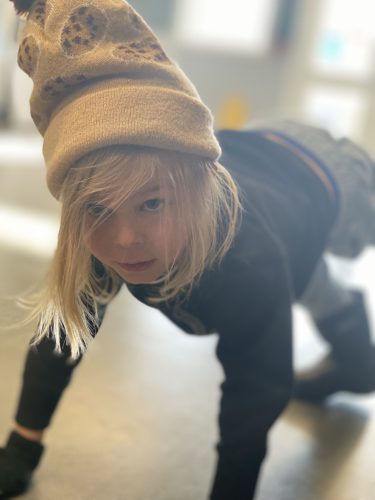
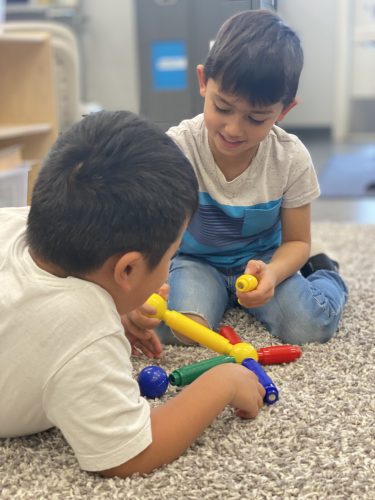
Personal and Social Development
Do you know that our staff focus on 5 social skills in each one of our classrooms?
Sharing . Cooperating . Listening . Following directions . Respecting personal space
We strengthen children’s social skills through emotional literacy. Our staff model good behaviour, giving children the opportunity to express themselves. Our staff purposely plan so children can take turns, help others, and manage conflicts. In our classroom, we talk about emotions. We read stories about emotions, and we find strategies to help children address and express their emotions appropriately. When children are socially and emotionally competent, they have healthy self esteem, self confidence, self-control, and self-efficacy.
Do you know children develop an understanding of addition and subtraction through everyday interactions even before they start school? For example, Aidan has 3 dinosaurs, After he shares one with his friend, he sees that he has two left. Our children participate in daily activities where children are counting, solving number problems, measuring, estimating, sorting, noticing patterns, adding and subtracting numbers.
Children develop social skills through teacher child relationships where children learn to trust and feel secure in our environment. The staff promote social development by planning the environment based on the developmental levels of the children, through peer interactions, interactions with adults and planned experiences. Together children learn about sharing, co-operation, taking turns, problem solving, conflict resolution and working together.
Intellectual Development
Children enhance their intellectual development through a variety of materials, equipment, and planned activities that reflect their ages, interests and abilities. Our staff ensure to provide an opportunity for open-ended activities that develop children’s memory, problem-solving skills, reasoning and thinking abilities both indoor and outdoors. The classroom is set-up in a way that children can participate in various center areas that promote listening, language, literacy, science, music, math, and learning about the community.
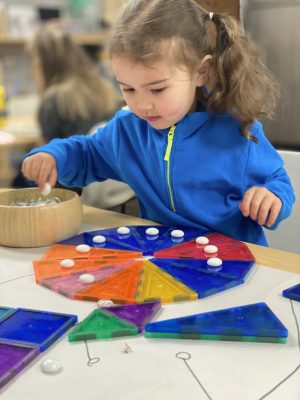
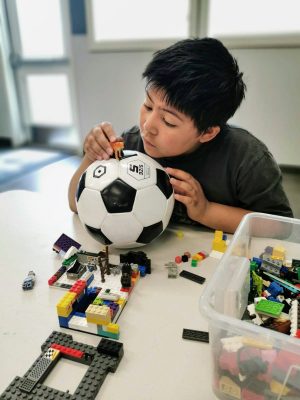
Creative Development
The role of the educators is to embrace children’s creativity by giving them the opportunity to express themselves and they’re creations that reflect their individuality and originality. We provide opportunities for children to learn about themselves and the world around them through visual arts, music, drama, and dance, make-believe, role-playing, and storytelling. As children develop their creativity, they are easily able to gain control of their bodies, and express thoughts and their feelings. The environment and play experiences are planned based on children’s interests, and educators give children ample opportunity to express creativity by providing open-ended materials. Our children also express themselves by using a variety of materials, like supplies from nature, loose parts, paper, paint, pencils and brushes. Creativity is a core part of our curriculum. It develops children’s motor skills, accelerates brain development, helps reduce stress, and builds children’s self esteem.
Emotional Development
We believe that children’s mental health is about social, emotional and behavioural well being. Our focus is to provide a positive environment where children can learn to understand, regulate and express emotions, form close, secure, satisfying relationships with adults. Educators will be expected to understand and strengthen the different areas of growth such as emotion regulation, social competence, attachment, and temperaments. This will be done by providing a warm and nurturing environment and providing a variety of experiences.
